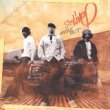With the opening number "Reverb," Soulive makes it clear that Break Out is indeed a break from their previous albums, highlighting a new sound less centered on Neal Evans' keyboards and much more on Eric Krasno's guitar and on the group's horn section (provided by longtime collaborators Rashawn Ross and Ryan Zoidis). While it may be argued that this is downplaying the most distinctive element of the Soulive sound, it certainly provides a more muscular feel to Break Out. The disc covers a lot of ground, often relying on its guests to set the tone. So there is some gumbo funk on the two cuts with Ivan Neville ("Got Soul" and "Take It Easy"), some hard-edged rock sounds with Robert Randolph (a cover of Jimi Hendrix's "Crosstown Traffic") and a great Memphis Soul feel with Reggie Watts ("She's Hooked" and the gutsy ballad "What Can You Do"). And the Watts duets are exceptional, as are two excellent instrumentals, the Latin-flavored
With the opening number "Reverb," Soulive makes it clear that Break Out is indeed a break from their previous albums, highlighting a new sound less centered on Neal Evans' keyboards and much more on Eric Krasno's guitar and on the group's horn section (provided by longtime collaborators Rashawn Ross and Ryan Zoidis). While it may be argued that this is downplaying the most distinctive element of the Soulive sound, it certainly provides a more muscular feel to Break Out. The disc covers a lot of ground, often relying on its guests to set the tone. So there is some gumbo funk on the two cuts with Ivan Neville ("Got Soul" and "Take It Easy"), some hard-edged rock sounds with Robert Randolph (a cover of Jimi Hendrix's "Crosstown Traffic") and a great Memphis Soul feel with Reggie Watts ("She's Hooked" and the gutsy ballad "What Can You Do"). And the Watts duets are exceptional, as are two excellent instrumentals, the Latin-flavored "Cachaca" and the keyboard-led "Vapor."
The members of Soulive again demonstrate that they are creative musicians who have great instincts, and Break Out is another fine outing, if not as distinctive as the group's earlier work. While the downplaying of the great B3-fronted sound that made Soulive so unique among modern groups hurts the album, Break Out is nonetheless a worthwhile effort and a welcome return for perhaps the most talented instrumental Soul group today.
By Chris Rizik

